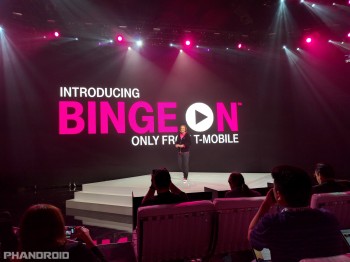
YouTube says T-Mobile is throttling its service and they’re not happy about it
It’s exactly what Net Neutrality and consumer advocates feared when T-Mobile introduced Binge On, the carrier’s latest Un-carrier scheme that allows customers to stream select video services — at lower 480p quality, mind you — in exchange for waiving the associated data costs on their monthly plan.
You may remember YouTube — which reportedly accounts for a 5th of T-Mobile’s cellular traffic — was strangely absent from T-Mobile’s Binge On announcement. T-Mobile said during their Q&A that this was a technical limitation of the carrier and that needed further cooperation from YouTube in identifying what was, or wasn’t, a video stream.
Now, a YouTube spokesperson tells the The Wall Street Journal the carrier has already begun throttling and/or degrading traffic to their site and mobile apps — all without their customers’ consent. This is after an advocacy group called The Internet Association (of which Google is a member) found that T-Mobile’s new practice now “appears to involve throttling of all video traffic, across all data plans, regardless of network congestion.” YouTube isn’t happy with the move and issued the following statement:
“Reducing data charges can be good for users, but it doesn’t justify throttling all video services, especially without explicit user consent.”
According to the FCC’s net-neutrality rules, internet providers cannot discriminate against traffic from some sources, while all others to flow unimpeded. This also applies to applications like YouTube which aren’t eligible for Binge On, but still have their service count against data buckets, despite streaming in 480p. While customers always have the option to disable Binge On, it’s enabled by default on 3GB+ plans, so many customers may not even know it’s active.
T-Mobile has yet to respond to YouTube’s complaints, although we don’t imagine it’ll be much longer before the always vocal CEO John Legere issues some sort of statement on his Twitter account.